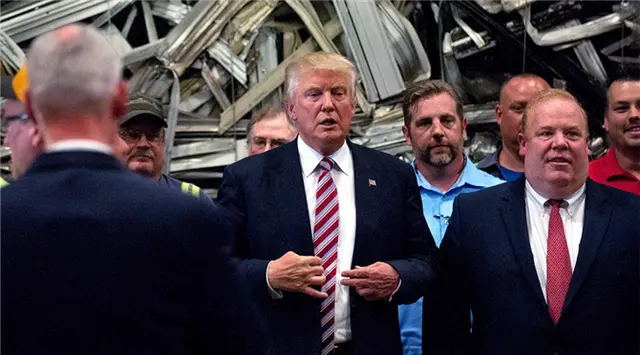Standing in front of a wall of garbage, Donald Trump shifted uncomfortably as he spoke Tuesday in the heart of Pennsylvania’s Rust Belt, trudging through a much-hyped speech about his plan to dismantle the last several decades of U.S. trade policy. The spirit of Trump’s rhetoric was the same as ever: free trade is bad, China is bad, and only he can make America great again. But this time, the remarks were prepared, forcing Trump to unenthusiastically recite the phrases “currency manipulator” and “unfair subsidy behavior” off a teleprompter while bashing the World Trade Organization. Still, he couldn’t help veering off-script.
“If China does not stop its illegal activities, including its theft of American trade secrets, I will use every lawful presi—hey, look, this is very easy, this is so easy,” the presumptive G.O.P. nominee said, interrupting himself. “I love saying this.” He then returned, stiffly, to the teleprompter: “I will use every lawful presidential power to remedy trade disputes, including the application of tariffs consistent with Section 201 and 301 of the Trade Act of 1974 and Section 232 of the Trade Expansion Act of 1962.”
Such grown-up phrases are new for Trump, whose flamboyant, improvisational style won him the Republican primary and now threatens to lose him the general. It seems hard to believe that Trump, whose criticism is usually limited to describing things as “very bad,” got the same thrill out of explaining how he would apply “tariffs consistent with Section 201.” But specific, heavily footnoted details about international trade policy and quotes from Alexander Hamilton, all delivered with the 12th-grade vocabulary befitting a potential president, are what Trump’s latest “pivot” is all about. The week before, Trump had delivered another pre-written speech—this one about Hillary Clinton’s foreign-policy record and business ties.
There are other signs, too, that Trump is attempting to professionalize his campaign. Earlier this month, he fired his former campaign manager, the hard-charging, Red Bull–swigging Corey Lewandowski, and began hiring a spate of seasoned political veterans to flesh out his formerly skeletal staff. So far this week, Trump has nabbed Ted Cruz’s communications director, Jason Miller; former R.N.C. staffer Michael Abboud; and Rand Paul’s digital director, Vincent Harris, to make his nascent digital operation competitive with Clinton’s massive voter-information and outreach database. “I am constantly building a superior political team,” he bragged in a statement announcing the hires.
Still, it’s easier to professionalize the Trump campaign than the man himself. Within hours of a terrorist attack in Istanbul on Tuesday, the billionaire had reverted to type, suggesting that America “fight fire with fire” by treating terrorists “violently . . . because we’re dealing with violent people viciously.” (That violent reaction, he suggested, would not be of a U.N.-sanctioned nature.) It’s just that kind of rhetoric that helped Trump win the Republican primary, but he’s struggled to adapt to a general-election audience. Paul Manafort, Trump’s top campaign adviser, has repeatedly promised donors and other terrified Republican leaders that he’ll whip him into a measured, disciplined political candidate. But no “pivot” period seems to last.
“I sort of don’t like toning it down,” the real-estate mogul said back in April, happily mocking the idea that he might be reined in. “When I’m in a room, talking, you’re one way; when I’m out here talking to you people, I’ve gotta be different, alright.” Back then, he was wildly swinging between disparate identities and policy positions. Now, it seems impossible for him to adopt any other identity for long, other than the one he already has: a full-blown narcissist.
(APD)
 简体中文
简体中文





